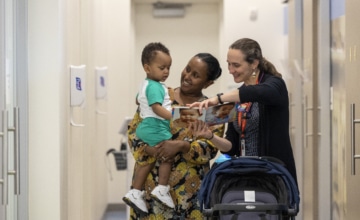As a result of a robust cross-sector effort, New York has begun work on the state’s First 1,000 Days on Medicaid initiative.
In the summer of 2017, a stakeholder group representing child care, child welfare, community-based organizations, philanthropy, public health, and mental health convened to create a plan that would use Medicaid levers, including Value Based Payment, to improve the health and development of New York’s infants and toddlers. The product, a 10-point plan to enhance access to services and improve outcomes for the nearly 60% of New York children ages 0-3 who depend on Medicaid, was released in December 2017 and includes the following proposed activities:
- Create a Preventive Pediatric Care Clinical Advisory Group
- Promote Early Literacy through Local Strategies
- Expand Centering Pregnancy
- New York State Developmental Inventory Upon Kindergarten Entry
- Statewide Home Visiting
- Require Managed Care Plans to have a Kids Quality Agenda
- Data System Development for Cross–Sector Referrals
- Braided Funding for Early Childhood Mental Health Consultations
- Parent/Caregiver Diagnosis as Eligibility Criteria for Dyadic Therapy
- Pilot and Evaluate Peer Family Navigators in Multiple Settings
The FY 2019 state budget included seed funding to support the First 1000 Days implementation. The State Medicaid agency reported on progress at a full stakeholder meeting in June 2018. Teams have begun researching project models, engaging additional partners, and exploring potential evaluation strategies. As other states look to New York for support in creating similar initiatives, a leader of the initiative offers this advice: To be effective, focus on what is covered by Medicaid, not only Medicaid coverage.




